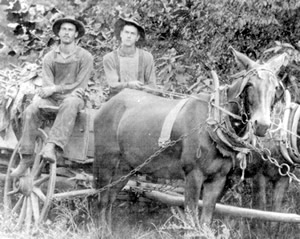Agriculture

Many European immigrants and those from rural communities in the British Isles had settled in Tennessee on familiar terrain so they could practice known agricultural methods. English and Scots-Irish settlers grew corn and wheat and practiced the art of distilling grains for liquor. Swiss and German immigrants developed some of Tennessee’s earliest dairies and planted early vineyards of grapes and hops.
In the decades leading up to the American Civil War, as transportation networks reached distant markets, many Tennessee farmers converted to large-scale cash crops. Cultivating tobacco and cotton required many hands to produce and process. By 1860, Tennessee’s population of enslaved laborers had reached nearly 25% of the population.
After the Civil War, Tennessee farmers rebuilt farms stripped by both armies. Newly freed African American farmers faced long odds. Some signed labor contracts in hopes of protecting themselves from unscrupulous land claims or unfair farm or market practices. Others worked as tenant farmers on rented land. Sharecropping was extremely perilous. For most, it was nearly impossible to get ahead. Tennessee’s Century Farm program, which lists over 1600 farms operated for one hundred years by the same family, includes ten notable African American farms. The McDonald Craig farm in Perry County, the Drake Farm in Sumner County, and the Matt Gardner Homestead in Giles County, all founded in the 1870s and 1880s, are some of the earliest.
In 1872, Tennessee appointed its first state commissioner for agriculture. J.B. Killebrew promoted modern methods and scientific farming. An ardent railroad booster, he believed that Tennessee’s agricultural future depended on recruiting a new generation of immigrants. With state geologist James Safford, he published a report on Tennessee resources and a map that was distributed at the 1876 Centennial Exposition in Philadelphia.
One of Killebrew’s proudest moments was the 1897 Tennessee Centennial Exposition. Modeled on the 1893 Chicago World’s Columbian Exposition, the fair was designed as a pleasure ground of amusements and entertainment. Illuminated at night and served by a dedicated railroad station, the underlying script was industrial progress, but the fair’s main thrust was the promotion of Tennessee’s agricultural and natural resources.
The U.S. Department of Agriculture, which had its own separate building at the Centennial, would soon be providing educational training for adults and instituting vocational agriculture programs in Tennessee schools. The greatest federal impact on Tennessee farms and farmers, still felt today, was the New Deal of the 1930s. The drastic drop in farm prices and decades of crop monoculture that had exhausted the soil and invited land erosion coincided with the advent of the Tennessee Valley Authority. As TVA re-engineered the state’s waterways for the production of electricity, federal policies were put in place to control farm output, help keep farmers from going under, and prop up commodity prices.